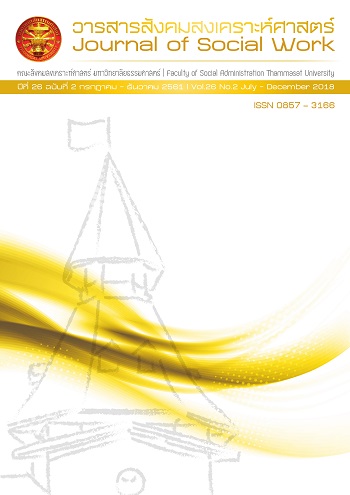Preparedness for the 4th renovation of Thai Labor
Keywords:
Preparedness, The 4th Renovation, Thai LaborAbstract
At present, the fourth industrial revolution has been in the spotlight and a focus of government and private sectors, business, educational institutions and non-government organizations. This industrial evaluation is the world’s major change and will definitely take place within the next 20 years. It is in the period of integration of manufacturing of products with great diversity to accommodate each consumer within short period, with cost saving and efficiency with everything connected in the form of “the Internet of Things (IoT) and with total use of digital technologies. The industrial revolution will lead to changes all over the world which is unavoidable to Thailand in terms of economic and social aspects. Thailand’s labor is another sector certainly affected by the fourth industrial revolution. Therefore, the labor must be aware of this and get ready to be equipped with knowledge, and analytical thinking, problem solving and language skills to transform themselves from unskilled labor and semi-skilled labor to skilled labor. However, it is not practical for the labor to do the development alone. The government as the administrator of the country must provide assistance and support to them in order that they can adapt and develop themselves. Preparedness to accommodate this mega change can be executed into 2 levels as micro and macro levels. For micro level, the labor must be active in self-development in terms of knowledge, attitude and working and living skills to be in compliance with the arising changes. As for macro level, the government as the country’s leader and administrator has to accelerate policy to deal with imbalanced labor production which does not align with labor market, low birth rate affecting the country’s population’s structure leading to shortage of labor and ageing society. The government must expand high speed internet network to increase the labor’s accessibility with low cost or without any cost charged to promote the labor’s advancement and develop knowledge in the internet technology. All these will finally transform the country to a learning society.The above strategies are vital to preparing Thailand’s labor‘s readiness and ability to adjust to changes taking place in the 4.0 revolution coming in the near future.
References
กิริยา กุลกลการ. (2560). ทุนมนุษย์ 4.0. สืบค้นเมื่อวันที่ 26 พฤศจิกายน 2561, จาก http://www.bangkokbiznews.com/blog/detail/642489
จอมพงศ์ มงคลวนิช. ASTV ผู้จัดการออนไลน์ . (6 พฤษภาคม 2557). ชี้เด็กอาชีวะเนื้อหอม! ตลาดแรงงานแห่ซื้อตัว. สืบค้นเมื่อวันที่ 17 ตุลาคม 2559, จาก http://manager.co.th/iBizchannel/ViewNews.aspx?NewsID=9570000049980
ปุณฑริก สมิติ. (2559). ก.แรงงาน วางแผนแม่บท มุ่งพัฒนาทุนมนุษย์รายอุตสาหกรรมรองรับไทยแลนด์ 4.0. สืบค้นเมื่อวันที่ 26 พฤศจิกายน 2561, จาก http://www.mol.go.th/content/55448/1481873074
ฝ่ายวิเคราะห์ตลาดแรงงาน กองวิจัยตลาดแรงงาน. (2558). สัดส่วนความต้องการแรงงานกับระดับการศึกษาของผู้สมัครงาน. สืบค้นเมื่อวันที่ 12 ตุลาคม 2559, จาก http://lmi.doe.go.th /index.php/2012-07-22-09-50-12/550-unemployment-0959
พงษ์เดช ศรีวชิรประดิษฐ. (2559). ผลสำรวจค่าจ้าง ปรับเฉลี่ย5%โบนัส2.3ด.‘เภสัช’เงินเดือนสูงสุด ‘ศิลปกรรม’ต่ำสุด. สืบค้นเมื่อวันที่ 19 ตุลาคม 2559, จาก http://forum.eduzones.com/topic/11237
พิริยะ ผลพิรุฬห์. (2560). ความ (ไม่) พร้อมของตลาดแรงงานไทย ในยุค 4.0. สืบค้นเมื่อวันที่ 9 กรกฎาคม 2560, จาก http://piriya - pholphirul.blogspot.com /2017 /03/40.html#!/2017/03/40.html
ยงยุทธ แฉล้มวงษ์.(2560). ไทยแลนด์ 4.0 แรงงานกลุ่ม Semi skilled เสี่ยงตกงาน. สืบค้นเมื่อวันที่ 9 กรกฎาคม 2560, จาก http://news.voicetv.co.th/Thailand /453564.html / Voice TV21
สรรเสริญ แก้วกำเนิด. ASTV ผู้จัดการออนไลน์. (2558). “ประยุทธ์” ปลื้มเด็กไทยแห่เรียนอาชีวะพุ่ง ศธ.- สอศ.เดินหน้ายุทธศาสตร์. สืบค้นเมื่อวันที่ 12 ตุลาคม 2559, จากhttp://www.manager.co.th/Politics/ViewNews.aspx?NewsID=95800 00069795
สุธิดา กาญจนกันติกุล. ฐานเศรษฐกิจ. (2560). รับมือแรงงานแห่งอนาคตสู่ไทยแลนด์ 4.0. สืบค้นเมื่อวันที่ 9 กรกฎาคม 2560, จาก http://www.thansettakij.com /content/126776
วิกิพีเดีย สารานุกรมเสรี. (2559). อุตสาหกรรม 4.0. สืบค้นเมื่อวันที่ 10 กรกฎาคม 2560, https://th.wikipedia.org/wiki/%E0%B8%AD%E0%B8%B8%E0%B8%95%E0%B8%AA%E0%B8%B2%E0%B8%AB%E0%B8%81%E0%B8%A3%E0%B8%A3%E0%B8%A1_4.0
วิกิพีเดีย สารานุกรมเสรี. (2560). อินเทอร์เน็ตของสรรพสิ่ง. สืบค้นเมื่อวันที่ 13 กรกฎาคม 2560, จาก https://th.wikipedia.org/wiki/%E0%B8%AD%E0 %B8%B4%E0%B8%99%E0%B9%80%E0%B8%97%E0%B8%AD%E0%B8%A3%E0%B9%8C%E0%B9%80%E0%B8%99%E0%B9%87%E0%B8%95%E0%B8%82%E0%B8%AD%E0%B8%87%E0%B8%AA%E0%B8%A3%E0%B8%A3%E0%B8%9E%E0%B8%AA%E0%B8%B4%E0%B9%88%E0%B8%87
วิฑูรย์ สิมะโชคดี. (2558). อุตสาหกรรม 4.0 (Industry 4.0) การปฏิวัติอุตสาหกรรมครั้งที่ 4 วิบากกรรมของภาคแรงงาน. สืบค้นเมื่อวันที่ 10 กรกฎาคม 2560, http://www.ex- decor.com/article/20/%E0% B8%AD%E0% B8%B8% E0%B8%95%
สำนักงานพัฒนาธุรกรรมทางอิเล็กทรอนิกส์. (2559). ETDA เผยผลสำรวจพฤติกรรมการใช้อินเทอร์เน็ตคนไทย ปี 2559 Thailand Internet User Profile 2016. สืบค้นเมื่อวันที่ 12 กรกฎาคม 2560, http://it24hrs.com
สมาคมโฆษณาดิจิทัล (ประเทศไทย). (2559). DAAT เผยข้อมูลผู้ใช้อินเทอร์เน็ตของไทย ไตรมาส 1 ประจำปี 2559. สืบค้นเมื่อวันที่ 12 กรกฎาคม 2560, http://www.daat.in.th
เสน่ห์ ศรีสุวรรณ. (2559). Startup คืออะไร : เสน่ห์ ศรีสุวรรณ 2559. สืบค้นเมื่อวันที่ 13 กรกฎาคม 2560, จาก https://www.smartsme.tv/content/20023
สุกัญญา ศุภกิจอำนวย. (2559). ไทยแลนด์ 4.0 ผลกระทบ'แรงงาน. สืบค้นเมื่อวันที่ 26 พฤศจิกายน 2561, จาก http://www.bangkokbiznews.com/blog/detail/ 638279
สุรัชพงศ์ สิกขาบัณฑิต. (2561). นโยบายประเทศไทย 4.0 : โอกาส อุปสรรค และผลประโยชน์ของไทยในภูมิภาคอาเซียน. สืบค้นเมื่อวันที่ 26 พฤศจิกายน 2561, จาก https://www.parliament.go.th/ewtadmin/ewt/parliament_parcy/ download/article/article_20180302145352.pdf
เอกชัย จั่นทอง. (2561). ผลกระทบนโยบาย 4.0 เสี่ยงทำแรงงานไร้อาชีพ. สืบค้นเมื่อวันที่ 26 พฤศจิกายน 2561, จาก https://www.posttoday.com/politic/report /562857
Autodesk. (2559). CAD/CAM. สืบค้นเมื่อวันที่ 13 กรกฎาคม 2560, จาก https://www.autodesk.com/solutions/cad-cam
BLT. (2561). แรงงานไทยในยุค 4.0. สืบค้นเมื่อวันที่ 26 พฤศจิกายน 2561, จาก http://www.bltbangkok.com/article/info/29/593
Information Technology and IT and communication. (2559). เทคโนโลยีสารสนเทศคืออะไร. สืบค้นเมื่อวันที่ 13 กรกฎาคม 2560, จาก https://jamesjames1234.wordpress.com/%E0% B9%80%E0%B8%97% E0%B8%84%E0%B9%82%E0%B8%99%E0%B9%82%E0%B8%A5%E0%B8%A2%E0%B8%B5%E0%B8%AA%E0%B8%B2%E0%B8%A3%E0%B8%AA%E0%B8%99%E0%B9%80%E0%B8%97%E0%B8%A8%E0%B8%84%E0%B8%B7%E0%B8%AD%E0%B8%AD%E0%B8%B0/
Thailand 4.0 : Smart Factory Industry 4.0 Thailand 4.0. (2559). ความฝันที่เป็นจริงได้หรือไม่? อุตสาหกรรมไทยกำลังตามหลังคนอื่นแค่ไหนแล้ว?. สืบค้นเมื่อวันที่ 13 กรกฎาคม 2560, จาก http://www.thailand40.com/thailand40. html
Wilaiphan S. (2559), พลิกโฉมหน้าการผลิต การปฏิวัติโลกอุตสาหกรรมครั้งที่ 4 (INDUSTRY 4.0). สืบค้นเมื่อวันที่ 10 กรกฎาคม 2560, จาก https://www. applicadthai.com/articles/พลิกโฉมหน้าการผลิต-ปฏิวัติโลกอุตสาหกรรมครั้งที่-4-industry-4-0/
Hermann, Pentek, Otto. (2016). Design Principles for Industrie 4.0 Scenarios. Retrieved July 13,2017, from http://ieeexplore.ieee.org/document/ 7427673/?reload=true&arnumber=7427673&newsearch=true&queryText=industrie%204.0%20design%20principles
ITU Committed to Connecting the world. (2016). Internet of Things Global Standards Initiative. Retrieved July 13,2017, from http://www.itu.int/ en/ITU-T/gsi/iot/Pages/default.aspx
World economic forum. (2016). The Fourth Industrial Revolution: what it means, how to respond. Retrieved July 13,2017, from http://www. weforum.org/agenda/2016/01
Downloads
Published
How to Cite
Issue
Section
License
The manuscripts published in the Social Work Journal is the copyright of the Social Work Journal, Thammasat University
Any article or opinion appeared in the Social Work Journal will solely be under the responsibility of the author The Faculty of Social Administration, Thammasat University and the editors do not need to reach in agreement or hold any responsibility.



